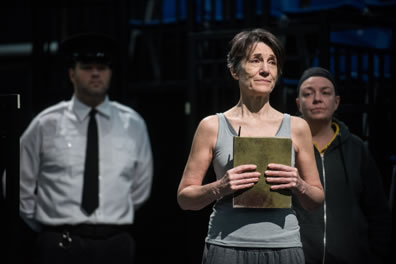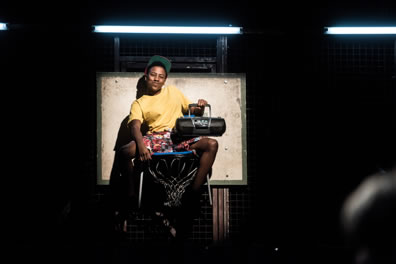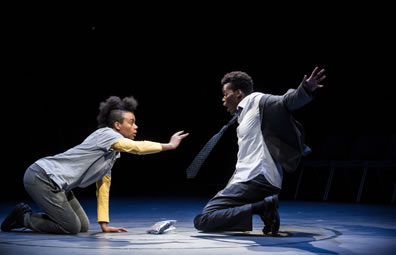The Tempest
Master of a Full Poor Cell
Donmar Warehouse, St Ann's Warehouse, Brooklyn, New York
Saturday, January 28, 2017, Block 3, C–319&320 (middle of bleachers for theater in the round)
Directed by Phyllida Lloyd

Hanna (Harriet Walter) gets set to play Prospero as a prison guard (Erick Betancourt) and another inmate (Sophie Stanton) watch in the Donmar Warehouse female prison production of William Shakespeare's The Tempest at St. Ann's Warehouse. Photo by Teddy Wolff, St. Ann's Warehouse.
Women in prison. It served as a metaphor for Rome in Phyllida Lloyd's staging of William Shakespeare's Julius Caesar and continued as a thematically resonant setting for her version of Shakespeare’s Henry IV. With The Tempest, however, metaphor has been turned inside out as the play serves to conclude what turns out to be the story of a single prisoner told through Shakespeare's canon. Taken as a whole, the series demonstrates Shakespeare’s redemptive power while showcasing the incredible, multilayered acting talents of Harriet Walter along with those of her fellow actresses.
Donmar Warehouse’s production of The Tempest, which ran in London last fall and is now playing at St. Ann’s Warehouse in Brooklyn, New York, is the last installment of Lloyd’s "Shakespeare Trilogy," each set in a women’s prison (Julius Caesar in 2013, Henry IV in 2015). Some cast members have appeared in each installment, most notably Walter, who played Brutus, Henry IV, and, now, Prospero, though—unbeknownst to the audience—she has been Hanna all along.
This was not Lloyd’s initial intent when she took the helm of Julius Caesar but rather the result of Walter’s dive into the character behind her character of Brutus. Lloyd’s motivation was to stage the play with an all-female cast. She settled on the women’s prison setting, which not only provided metaphorical fuel to the drama but mitigated the sexist snobbery that comes with women playing male roles (including the fact that the actresses can seem androgynous in their prison garb). An incredibly effective gotcha ending (I still shudder writing my recollection of it) transported Caesar’s Rome to 21st century society and seemed to close the book on the prison as a thematic device.
However, Walter had opened another book. At Lloyd’s direction, the cast members built prison characters mirroring the Shakespeare character they would be playing. Lloyd partnered with Clean Break, a theater company that specializes in working with female inmates, giving the professional cast access to real-life alter egos for their characters. You can experience more fully these characters behind the Shakespeare characters at donmarshakespearetrilogy.tumblr.com with links to videos of each actress in character telling her story as a prisoner and member of Hanna's prison drama group.
Walter decided that an inmate cast as Brutus would be a woman interested in politics and a respected member of the prison population: someone serving a long sentence, perhaps for a politically motivated crime. Her research led her to Judy Clark, a radical political activist who drove the getaway car in a 1981 Brink’s robbery in New York that left two police officers and a security guard dead. At the time, Clark was 31 years old and had an 11-month-old child. She was sentenced to the maximum sentence of 75 years to life and not eligible for parole until 2057, when she would be 107. "She has, very generously, shared so much of herself with us during this process," Walter says in the program notes for The Tempest. "All three plays, in some way, are underpinned by Judy Clark's story," says Lloyd.
As Lloyd and Walter continued the series with Henry IV, the theme of family separations imposed by prisons became a subtext of the production. Totally unaware of this subtext, I only appreciated the prison setting’s reflection in the characters of Shakespeare’s Henry IV and felt the production tripped up on its conflation of the two parts into one. Lloyd and company right the ship with The Tempest—though, there is, actually, no ship, not even one represented as stagecraft—which has the same profound impact, though of a different tenor, as Lloyd's Julius Caesar.
As with the previous productions, Lloyd’s staging puts us inside a prison. The set is identical to that used for Henry IV, a basketball court in the prison gym. On each side are four bleacher "blocks" backed by chain-linked fences, gates, and guards. At center court is a desk with a chair and a prison cot. Even before we enter, we watch the prisoners enter, marched in chains through the crowded lobby. Some have sour dispositions, some glance about nervously or bemusedly, others keep their vacant eyes cast down; Walter walks with grim determination.
At play’s start, the inmates are marched into the play space, each carrying a filled black trash bag. “Places, ladies,” a guard says, and as the inmates move to various locations around the theater, Walter steps to a microphone. Introducing herself as Hanna (my spelling—Walter is listed only as Prospero in the program), she tells her personal story which echoes that of Judy Clark. "Prison is a time of reckoning,” she says. “The last 35 years of my life have been defined by that reckoning." The prisoners then rush onto the floor and empty their bags of trash—bottles, plastic grocery bags, sneakers—in a circle of flotsam defining the boundaries of Prospero’s island.
With this introduction of Hanna, Walter signals to the audience that we are about to watch two performances in one. First evidence comes in the translation of Shakespeare's opening scene of a shipwreck-causing storm (a storm conjured by the magician Prospero) into a psychological tempest. As Walter sits at the desk reading a book, a soundtrack of roaring wind and rain builds while the prisoners positioned around the theater begin moaning, wailing, and screaming. Walter gets up and, after some consternated pacing, begins screaming herself, clutching her book. Another prisoner runs up to her, grabs the book, and tosses it away. “If by your art, my dearest father, you have put the wild waters in this roar, allay them,” the other prisoner implores. This is Miranda (Leah Harvey), Prospero’s daughter, and we are now into Shakespeare’s play.
Walter’s Prospero is a caring father with a strong sense of duty; as such, his benevolence can easily cross the line into despotism. He holds a bitter grudge against his brother, Antonio (Carolina Valdés), and the King of Naples, Alonso (Martina Laird), for their part in usurping him as the Duke of Milan and banishing him to the seas along with his toddler daughter. Prospero had studied magic before his banishment and perfected it after he and Miranda landed on the desert isle, so he has tremendous power, albeit in a confined space. Among the 15 Prosperos and a Prospera I’ve seen over the years, Walter’s is certainly among the finer renditions in and of itself.
It’s her Hanna that sets her Prospero apart from the rest. Watching this portrayal, we also come to know Hanna, a caring mother figure for the other prisoners with a strong sense of duty; she, too, can cross the line into despotism. She holds a bitter grudge against Antonio and Alonso (or the prisoners playing them), as if they were responsible for betraying her to law enforcement. She clearly has tremendous power, but it's within the prison. This duality of characters hits its apex when Prospero decidesC, at Ariel’s prompting, to leave off whatever plan of vengeance he has for Antonio and Alonso and take the course of forgiveness. Walter’s Prospero—and her Hanna—has to work hard to express forgiveness for Antonio, physically grinding her way through her lines. In this scene, Walter gives her all, doubled, as her Hanna peers through the facade of Prospero.
Like the previous two productions of the trilogy, in this Tempest, prison life blurs with the world of the play: most notably as the shipwrecked Neapolitans, who arrive in suits and ties, are treated as new inmates entering the jail, changing into prison wear at the guard's instruction (Alonso, the King of Naples, doesn't take kindly to being thus ordered around). However, unlike the other two productions, the blend is not merely metaphorically psychological but driven by the play's language.
Prison references abound in the text, some direct, including 12 specific uses of the word cell for Prospero’s home, often a “poor cell.” Deciding to finally tell his true history to his daughter, Prospero notes that Miranda doesn’t know “Of whence I am, nor that I am more better than Prospero, master of a full poor cell, and thy no greater father.” When Prospero asks Ariel "How fares the king and's followers?" Ariel replies, "Confined together in the same fashion as you gave in charge, just as you left them; all prisoners, sir, in the line-grove which weather-fends your cell." Upon greeting Alonso in the final scene, Prospero says, “Welcome, sir. This cell's my court: here have I few attendants and subjects none abroad.”
On the flip side, the word free and its derivations appear 20 times in the play. Many of these references—specifically referring to the opposite of imprisonment—wind through the character of Ariel (Jade Anouka, blending break-dancing moves, spritely behavior, and poetic clarity in her verse readings). Before Prospero's arrival on the island, the witch Sycorex had “in her unmitigable rage" locked Ariel "into a cloven pine, within which rift imprisoned [she] didst painfully remain a dozen years.” Prospero threatens to do the same to Ariel, except that he would "rend an oak and peg thee in his knotty entrails till thou has howled away 12 winters." Ariel's fault: reminding Prospero that he had promised her liberty. "Before the time be out?" Prospero retorts. Freedom also is associated with Caliban, the other native islander and son of the late Sycorex. Notably, for Caliban (Sophie Stanton, who is laden with garbage flotsam to create her misshapen form), freedom doesn't mean leaving prison but removing himself from Prospero's sphere of influence.


Top, Ariel (Jade Anouka) gets ready to do Prospero's bidding in the Donmar Warehouse production of William Shakespeare's The Tempest at St. Ann's Warehouse. Above, Miranda (Leah Harvey) and Ferdinand (Sheila Atim) meet for the first time. Photos by Teddy Wolff, St. Ann's Warehouse.
Some prison references emerge through the context of the setting, the island and prison becoming one and the same in our conscious. Back in the opening scene, as Prospero begins to describe his usurpation, Miranda introduces the notion of "foul play" as the cause for their banishment. "By foul play, as thou say'st, were we heaved thence, but blessedly holp hither,” Prospero replies. To Ferdinand, Alonso's son and now suitor to Miranda, Prospero threatens to "manacle thy neck and feet together." Later, he tells Ferdinand, "If I have too austerely punished you, your compensation makes amends." Ferdinand (Sheila Atim, bringing delightful hip-hop manners and unabashed youthfulness to the part) is so head-over-heels in love with Miranda he proclaims, with no hint of irony, "Let me live here ever; so rare a wonder'd father and a wife makes this place Paradise." Then there's one of the biggest laugh lines of the night. After Ariel's vision drives Antonio, Alonso, and the king's brother, Sebastian (Shiloh Coke) to distraction, Gonzalo (Zainab Hasan) tells the guard to "follow them swiftly and hinder them from what this ecstasy may now provoke them to." The guard, hearing that the others are reacting to ecstasy, tells Gonzalo, "You're first up for a piss test." Of course, that line is not Shakespeare's.
But it all comes back to Shakespeare for the production's ultimate emotional wallop. The magical pageant Prospero conjures for the now-betrothed Miranda and Ferdinand comprises prisoners carrying large white balloons on which are videocast scenes of nature, people, fast cars, and television commercials (this work by Duncan McLean, the production's video designer, equals any special effect I saw at theme parks when I covered the amusement industry). In his subsequent vexation, Prospero pops each of the balloons as "our revels now are ended" and the visions melt "into air"—Walter pops the last remaining balloon—"into thin air." As Prospero prepares to meet the king's party and present himself as sometime Milan, Walter removes her inmate jacket revealing her own suit and tie underneath. Each member of the audience has been given a pinpoint flashlight and now are instructed to turn them on. With only a soft spot on Walter, she delivers Prospero's "Ye elves of hills, brooks, standing lakes, and groves" speech announcing his intentions to abjure "this rough magic." Walter rotates to address the points of light surrounding her, and in her bemused expression we see three characters there: Prospero, Hanna, and Walter, too. Prospero's epiphany becomes Hanna's appeal to, and Walter's connection with, the audience.
If you think you know what's coming, you don't know Lloyd and how these plays are progressing on two different though intertwined planes, that of Shakespeare's plays and what has now become the story of Hanna. So, who is "set free?" Here's one clue. Stanton, who plays Caliban, also played Falstaff in Henry IV, but her prison character is the same for both plays. Caliban sexually assaulted Miranda before the time of The Tempest; now at the end of the play, after Prospero sends him "to my cell," telling him, "as you look to have my pardon, trim it handsomely," Stanton's Caliban heads off stage but rushes for another groping of Miranda before other prisoners hustle her away. The significance of this moment is in knowing what becomes of Caliban upon The Tempest's promised end.
As for Hanna's promised end, that requires a spoiler alert (click here if you want to read this production's ending). It is an ending that demonstrates how, while Shakespeare's play has ended, his work has not. Shakespeare and "the drama group" impact lives long after those lives have been exposed to it. And so do the redemptive powers of individuals who choose forgiveness and benevolence over vengeance and tyranny.
And so my review ends. However, the story of Hanna's alter ego, Judy Clark, has not ended. On December 30, just two weeks before The Tempest opened at St. Ann's Warehouse, New York's Governor Andrew M. Cuomo commuted Clark's 75-years-to-life sentence to 35 years to life, making her eligible for parole this year. Walter describes Clark as a woman who "has moved from revolutionary fury to an almost Buddhist wisdom," but Cuomo's clemency has stirred fevered opposition from law enforcement officials and conservatives. Yet, the echoes of Prospero's epilogue sink further into our concsience: "As you from crimes would pardoned be, let your indulgence set me free."
Eric Minton
February 4, 2017
Comment: e-mail editorial@shakespeareances.com
Start a discussion in the Bardroom



 Find additional Shakespeareances
Find additional Shakespeareances